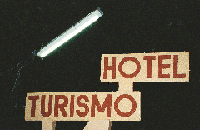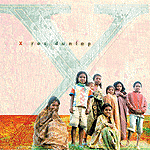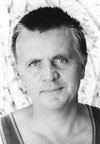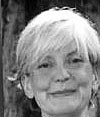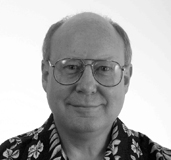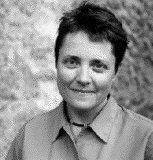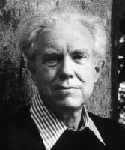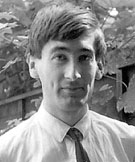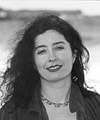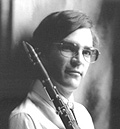"I had complete strangers coming up, with tear-stained faces (saying) how powerful it was ..."
concert repertoire includes
East Timor multimedia:
|
|
|
Australasian
|
and
|
American
|
composers listed in alphabetical order within categories
|
|
|
Tekee Tokee Tomak
Using photographs by various photographers, this piece was premiered in Manchester on our tour last January-February of the UK and Hong Kong. David Morris described it, in Clarinet & Saxophone, Spring 2003, as a "portrayal of post-independence East Timor, full of smiling people and beautiful landscapes".
Like all of Wesley-Smith's recent multimedia pieces, it requires a Macintosh computer (which we will bring with us), an LCD or DLP data projector (readily available these days - we will bring one of those, too), some sort of screen, and a stereo sound system.
|
cl & CD-ROM
[2002]
top
e-mail him
|
Martin Wesley-Smith
images by various photographers
"Tekee Tokee Tomak" means, in a rough translation from the Tetum, "Let's get together and enjoy ourselves". This is what the East Timorese people are now trying to do in order to re-build their shattered lives and country.
|
12'
|
|
Welcome to the Hotel Turismo
... they went mad - they cried, and cheered (four times back to the stage, and I was beginning to get emotional too), and were spellbound. A couple of times - like in the cadenza, and right at the end before the 'Welcome to the Hotel T' comes back), it was SO quiet - it freaked me out ... I had complete strangers coming up, with tear-stained faces (saying) how powerful it was ...
cellist Rachel Scott after a 2002 performance of Turismo in London
|
bass cl & CD-ROM
[2000]
top
e-mail him
|
Martin Wesley-Smith
images by various photographers
David Vance in The Sydney Morning Herald, August 13 1998, writing about Wesley-Smith's Timor piece Quito:
"(His) music has never been far removed from political or social comment, and his gift for pastiche has served him well in adopting familiar styles, often (but not always) drawn from popular music, to ironic or satiric purposes."
from a Timorese listener in Darwin to the ABC broadcast of Quito, May 6 1997:
"It is a masterpiece of music. I cried my eyes out until no tears were left. I felt the tragedy of East Timor perforating my bones as I never felt before. I'm going to buy the CD."
** to download and view a short Shockwave movie (2.6MB) of the last section of this piece, click here
|
16'
|
|
X
Commissioned by American clarinetist F. Gerard Errante, this piece has been performed, by him and by Ros, many times in the USA. It was composed in 1999 as the Indonesian military-promoted militia carnage was raging across East Timor. At the time, resistance leader Xanana Gusmão (the "X" of the title) was in Cipinang Prison, Jakarta.
see reviews of a performance of "X" in London, Feb 6 2003
see, also, separate web page
|
cl & CD-ROM
[1999]
top
e-mail him
|
Martin Wesley-Smith
images by various photographers
an audio-only version of this piece can be heard on Ros Dunlop's CD X:
|
12'
|
|
Afghanistan multimedia:
|
|
Merry-Go-Round
with guest cellist or bass clarinetist
or in its solo version
about Afghanistan & Afghan refugees, commissioned by Charisma with financial support from the Music Board of the Australia Council
David Morris: "... the evening was brought to a close with Merry-Go-Round, (Wesley-Smith's) treatment of contemporary Afghanistan. More scenes passed rapidly before us, including children and men having naive fun aboard a small home-made merry-go-round. This, we were told, was an allegory for the repeated invasions suffered by the people of Afghanistan, but it worked most powerfully as a striking reinforcement of common humanity."
|
cl (& bass cl or vlc)
& CD-ROM
[2002]
top
e-mail him
|
Martin Wesley-Smith
photography by George Gittoes
and Alice Wesley-Smith
George Gittoes is one of Australia's foremost figurative painters. He gives us a powerful, close up response to conflicts best known to us from the nightly news - famine and peacekeeping in Somalia, de mining after civil wars in Cambodia, Pakistan, Afghanistan, the Kibeho massacre in Rwanda, sectarian violence in Northern Ireland, ethnic cleansing in the former Yugoslavia, the elections in South Africa which brought Mandela to power, eruptions to the peace process in the Middle East - together with journeys to less familiar places - China, Tibet, Bougainville, and most recently, the effects of the War on Terror in Pakistan, Aghanistan; 'shock and awe' in Iraq.
|
16'
|
|
Iraq multimedia:
|
|
Weapons of Mass Distortion
about the Coalition of the Killing's 2003 invasion of Iraq
These days we are seeing more and more of what in 1946 George Orwell exposed (in "Politics and Language") as the deceits and devices of "doublespeak". For example: "collateral damage" really means the maiming and killing of innocent civilians; "removal with extreme prejudice" means assassination; "incontinent ordnance" are bombs which hit schools and hospitals by mistake; "active defense" is invasion; and an "energetic disassembly" is a nuclear explosion. During the Vietnam War, "limited duration protective reaction air strikes" meant bombing Vietnamese villages. In Australia, asylum-seekers, who have committed no offence, are dismissed as "illegals". As Melbourne barrister Julian Burnside points out: "(Language) can hide shocking truth, it can deceive a nation, it can hand electoral victory to the morally bankrupt."
Rumsfeld's word "deconfliction" meant invading Iraq - at the cost of thousands of lives, massive damage, and billions of dollars - to stop it using (apparently nonexistent) weapons of mass destruction and giving them to terrorists with whom it apparently had no links. This piece looks at the abuse of language, particularly the use of doublespeak in undermining the democracy in whose name we invaded Iraq.
"When I use a word," Humpty Dumpty said, in rather a scornful tone, "it means just what I choose it to mean - neither more nor less."
"The question is," said Alice, "whether you can make words mean so many different things."
"The question is," said Humpty Dumpty, "which is to be master - that's all."
|
|
cl & CD-ROM
[2003]
top
e-mail him
|
Martin Wesley-Smith
photography by George Gittoes and others
cartoons by Steve Bell, Alan Moir, Peter Nicholson and others
some lyrics by Peter Wesley-Smith
choir: Canberra Choral Society
tenor soloist: David Hamilton
concept, music, programming, script etc:
Martin Wesley-Smith
Some might disagree with the viewpoint of this piece. But Iraq was invaded in order to bring democracy to the poor oppressed people of Iraq, who had been suffering under the yoke of Saddam Hussein's despotic rule. Our own democracy still allows (although it's under threat), free speech. If this piece provokes discussion of the issues involved, then well and good ...
some light reading:
|
13'
top
|
pieces for clarinet & CD/electronics
include:
|
|
You Can Take It Anywhere
This was written for American clarinetist Gerard Errante on one of his visits to Australia.
Bailey:
"In this work, the juxtaposition of intervals creates a whole world of harmony for solo instrument. A lot of careful work went into the actual pitch of the notes which followed one another. It is 'careful' for reasons of ease to facilitate a linear harmonic structure. The performer uses this to be free with the way s/he takes it ..."
|
bass cl & delay
[1998/2001]
top
|
Judy Bailey
born in New Zealand; renowned jazz pianist, composer, arranger and music educator; lives in Sydney, performing throughout Australia and New Zealand; has taken part in many jazz festivals and composing women's festivals; has recorded two CDs for the ABC and has toured Australasia for Musica Viva; recipient of numerous prizes, including a "MO" award for Female Jazz Performer and an APRA award for Jazz Composition
|
2-10'
|
|
Circles in the Sun
Brockman:
Shortly before embarking on this piece, I read a short story by Argentine writer Jorge Luis Borges titled The Circular Ruins. In it, a wizard paddles upstream to an overgrown abandoned ritual site in the forest, the sacred circle of the god of fire. There he begins the arduous task of dreaming a man. Yes, through his dreams, after untold torment and numerous false starts over several years, he did indeed produce a son.
The wizard spent years instructing his son in the mysteries of the universe and the cult of fire. When he was ready, the young man was sent downstream many miles away, but, first, the wizard destroyed in the boy's memory all recollection of knowing he was merely a phantom. Later, the wizard heard talk of a charmed young man, at a temple in the North, who was able to walk on fire. "Of all the creatures that people the earth, Fire was the only one who knew his son to be a phantom".
As the story ends, with fire engulfing his circle in the forest, the old wizard must come to terms with his own death. Prepared to walk into the flames, "with relief, with humiliation, with terror, he understood that he also was an illusion, that someone else was dreaming him." Like the story, the music is about circles with circles.
|
cl & CD
[2002]
top
e-mail her
|
Jane Brockman
is a US composer based in Santa Monica. Her focus is entirely on concert music, which has been recorded by many labels and toured by many ensembles. After some years as professor of composition in Connecticut she now works full time as a composer in California.
|
7'
|
|
Bastard's Broth
commissioned by English saxophonist Kyle Horch, Steve arranged, in 2000, the saxophone part for bass clarinet; with the format of a jazz medley, the piece whizzes through many different styles very quickly with a zaniness reminiscent of Frank Zappa
In 2001 Steve was a guest composer at the fifth Forum for Contemporary Piano Music in Heilbronn, Germany; in 2002 he was a guest professor in composition at the Musikhogskolan in Piteå, Sweden.
|
bass cl & CD
[1993]
top
e-mail him
|
Steve Ingham
studied at the University of York (England) with Bernard Rands, the University of Bloomington, Indiana, with Donald Erb, and, later, with Klaus Huber and Brian Ferneyhough at the Staatliche Hochschule fur Musik, Freiburg. He now teaches at the University of Wollongong in New South Wales.
|
5' 34"
|
|
King Friday
Lowenstern:
"(This) is in response to an episode of Mr. Rogers' Neighborhood. Clarinetist Richard Stoltzman was the guest and the two of them were at Joe Negre's music shop. Watching this episode unfold, I figured this was going to be ripe with possibilities so I immediately popped in a video cassette. Stoltzman was describing the members of the clarinet family when Mr. Rogers asked, 'What's that big one?' Stoltzman answered, 'Oh that's a bass clarinet. It's found mostly in bands. It's pretty obscure and hard to play. There isn't really much call for it.' I was livid. Since both King Friday and Mr. Stoltzman were living in the land of make-believe, I was inspired to write this piece."
|
bass cl & CD
[1996]
top
e-mail him
|
Michael Lowenstern
bass clarinetist; has performed, recorded and toured with ensembles of every variety including The Klezmatics, The Steve Reich Ensemble, The Orpheus Chamber Orchestra, and the Chamber Music Society of Lincoln Center; appointed in 2000 to the New Jersey Symphony; also active as a composer for concert, recordings, dance, film, CD-ROM, advertising, and his own performing ensembles; is on the faculty of the Juilliard School.
|
5' 30"
|
|
Aurora
Smith:
"At the time this piece was created, I was in the middle of a Canadian winter. I wanted to create the feeling of huge space, the continual shift of focus suggesting the flickering lights of the Aurora Borealis."
|
bass cl & CD
[2001]
top
|
Margery Smith/Will Frasier
Margery is an accomplished clarinetist as well as composer. Her solo engagements have included appearances with the Sydney Symph
as soloist on clarinet and saxophone. Her latest work, T(F)ree Radicals
for 3 Bass Clarinets, was composed for Touchbass.
|
10' 30"
|
|
For Clarinet & Tape
This, and its version for marimba, is the most-performed piece of Australian chamber music of all time. CD recording by Peter Jenkin (A Day in the Life of a Clarinet, Tall Poppies TP086).
For Marimba & Tape has been recorded by Alison Eddington, Daniella Ganeva, Rebecca Lagos, Graeme Leak (order his new book on-line here), William Moersch and Tom O'Kelly.
|
cl & CD
[1983]
top
e-mail him
|
Martin Wesley-Smith
see discography
Wesley-Smith's latest commissioned work - True, for soprano, choir, flute & piano - was premiered on Sat Oct 26 2002 by the Canberra Gay and Lesbian Qwire (click here to read the libretto by Peter Wesley-Smith)
|
11'
|
|
White Knight & Beaver
one of Wesley-Smith's best-known Lewis Carroll pieces; it's as if a bass clarinet-playing Dodgson (Carroll's real self) shows Alice how interesting snippets of music result when you play a music-box backwards and upside-down - and how you can discover palindromes and doublet processes if you play through a musical encoding of the DNA of the beta globin sub-unit of the haemoglobin of Escherichia coli, a bacterium found in the stomach
|
bass cl & CD
[1985]
top
e-mail him
|
Martin Wesley-Smith
A new recording of this piece, played by Charisma (Ros Dunlop, clarinet, and Julia Ryder, cello), has just been released on the CD Charisma (Greatwhitenoise GWN002)
for information about Wesley-Smith's major Carroll piece Boojum!, for choir, piano & percussion, click here
|
9'
|
|
Onomatopoeia
Westlake:
"(this piece) was written following an intensive study of the contemporary bass clarinet repertoire with Dutch exponent Harry Spaarnay; it represents a release from the rigours and discipline that surround much twentieth-century repertoire into a more relaxed improvisational style. A unique sound world is established by remaining for much of the piece in the little used upper register of the instrument and incorporating techniques such as circular breathing, multiphonics, slap tongue and flutter tongue."
"a breath of fresh air with its bright colours, lively rhythms & brilliant ideas" (The Australian)
|
bass cl & delay
[1984]
top
e-mail him
|
Nigel Westlake
Having written many chamber and orchestral works and film scores (e.g. Babe), Nigel is one of Australia's most successful composers. He is also an excellent clarinetist.
|
7'
|
|
solo pieces include:
|
|
Steep Steps
This is a short work for bass clarinet written as a present for Carter's clarinetist friend Virgil Blackwell. It is the latest in a succession of short solos and duos that he began in the mid 1990s, most of them dedicated to colleagues. The form of the piece is free and doesn't fall into any traditional plan. Throughout, Carter plays with dramatic contrasts in timbre among the bass clarinet's different registers. The title may come from the prominent leaps from register to register.
|
bass cl
[2001]
top
|
Elliott Carter
Twice winner of the Pulitzer Prize, and the first composer to receive the United States National Medal of the arts, Elliott Carter is internationally recognized as one of the leading American voices of the classical music tradition. Encouraged into a musical career by friend and mentor Charles Ives, he is one of the handful of living composers elected to the Classical Music Hall of Fame. At 91 he wrote his first opera! At 94 he is still composing and exploring new fields ...
|
3'
|
|
Instant Winners
Until recently limited to transcriptions, the solo literature for Eb clarinet has begun to include new music written immediately for the instrument and performed by specialists such as Virginia Anderson, whose work inspired these pieces. Of the nine short "Instant Winners," none much more than a minute long, any number may be performed in any order. They explore contrasting sonic resources (reed taps, multiphonics, squeaks, speaking, as fast as possible random finger movements, quarter tones, hum and play, foot stomping) or, should one wish to hear them as such, musical moods.
|
Eb cl
[1984]
top
|
Barney Childs
Childs was largely self-taught until the early 1950s, when he studied at Tanglewood with Carlos Chavez and Aaron Copland and in New York with Elliott Carter. Eclectic in nature, Childs' compositions freely explored diverse avenues of musical thought and drew inspiration from many sources, including traditional western concert music (especially that of such composers as Hindemith, Ives, Ruggles and Copland), the open form works of John Cage, and jazz of all styles.
|
2-8'
|
|
Frenzy and Folly, Fire and Joy
"All the uproarious pipes we played! Frenzy and folly, fire and joy!". The quote is from Australian poet John Shaw Neilson, whose poems have inspired several of the composer's works. This one is in 'ballad' form with nine 'verses'. The characteristic feature is that, despite a recurring 'rhyme-scheme' and unifying ideas from verse to verse, each one shakes a new narrative 'twist' out of its sleeve to produce something mid-way between strophic and 'through-composed' form, as well as mid-way between tonal and atonal styles.
|
cl solo
[1999]
top
e-mail him
|
Graham Hair
Australian composer Graham Hairhas been Professor of Music at Glasgow University since 1990. For ten years before that he was head of composition at the Sydney Conservatorium. He is also an Adjunct Professor at Monash University, and has been a Visiting Professor at Princeton and Composer in Residence at the Massachussetts Institute of Technology. His works include many for women's voices (e.g. Serenissima, Songs of the Sibyls), pieces based on popular music, and a Choral Symphony, The Great Circle.
|
9'
|
|
25 Measures
written for Australian clarinetist Peter Jenkin, this piece is short, succinct, quirky and lighthearted
|
cl solo
[1996]
top
e-mail her
|
Elena Kats-Chernin
was born in Tashkent, in the former USSR, in 1957. In 1975 she migrated with her family to Australia, where she studied at the NSW Conservatorium. After studying with Helmut Lachenmann in West Germany, she remained in Europe for over a decade, writing incidental music for State theatres in Berlin, Vienna, Hamburg, and Bochum. She returned to Australia in 1994 and is now resident in Sydney where she is frequently commissioned and performed.
|
1'
|
|
Etude for Barney
Phillip Rehfeldt asked a number of composers, and clarinet composer/performers, to write short pieces for Barney Childs. This was Eric's response.
|
cl solo
[1990]
top
e-mail him
|
Eric Mandat
composer/performer (clarinet); professor of music at the University of Southern Illinois University at Carbondale, teaching clarinet; prolific composer for clarinet and bass clarinet; his mentor has been William O Smith; he has recorded and performed extensively throughout the USA with a wide variety of musicians
|
4'
|
|
Hauturu
This piece ("Where the Winds Rest") was written as a response in sound to a visit to the rugged island of Little Barrier (Hauturu), a bird sanctuary in the Hauraki gulf. John marvelled at the largely unspoilt grandeur of this fascinating environment with its extremely rough beeches, huge trees amid thick jungle, and the many varieties of indgenous birds.
|
bass cl
[1992]
top
|
John Rimmer
recently retired from Auckland University where he held the position of Chair of the School of Music. One of New Zealand's leading composers, he now divides his time between composing and conducting.
|
9'
|
Character Sketches
(Movement 2: KP)
Satterwhite:
KP: a girl I used to know who stopped her strident bitching only to be vacuous. This movement is one of four. Basically all movements decribe various women in the my life.
|
cl solo
[1973]
top
|
Marc Satterwhite
Marc Satterwhite is a composer and bass player. In his performance capacity he has played in the Mexico City Philharmonic. His experiences in Latin America have had a profound influence on his composition. He has taught at the University of Western Michigan, University of Indiana and Lamar University; he is currently on the faculty at the University of Louisville. He has written for a variety of genres, and his music has been performed all over the USA, South America, Canada, Europe, Japan, Australia and South Africa.
|
8'
|
|
Cut to the Chase
the title refers to early vaudeville routines when the vaudeville artist, upon realising that the audience is not responding or something has gone wrong on stage, "cuts to the chase" when he or she is chased around to close the act ...
|
cl solo
[1996]
top
e-mail him
|
Richard Vella
Australian composer. At one time Professor of Music at the now-defunct Music Department at the University of Latrobe, Richard now lives in Queensland.
|
45"
|
|
Scream
a highly virtuosic work for bass clarinet, Scream explores both ends of the instrument's range, delivering at lightning speed; it was first performed in the USA by bass clarinetist Henri Bok at the International Clarinet Festival in Oklahoma
|
bass cl solo
[2000]
top
e-mail him
|
Paul Witney
Born in 1973, Australian composer Paul Witney studied with Nigel Butterley. His works have been performed in the Ukraine, Canada, USA, Holland, Brisbane, Melbourne and Sydney.
|
|
|
lecture/demo topics include:
|
|
Musical Activism
|
|
Current Trends in Australian Music
|
|
New Australian Music for Clarinet
|
|
Carrollian Musical Processes
|
concert repertoire |
lecture/demo topics |
Dunlop & Wesley-Smith bios |
pics |
top of page
e-mail Ros |
e-mail Martin |
London review 1 |
London review 2 |
schedule
|
schedule:
|
[grab a slot!] |
|
Mon Sept 22
|
depart Australia |
|
Tues Sept 23
|
concert, Bowling Green State University, Ohio
|
|
Wed Sept 24
|
|
|
Thurs Sept 25
|
concert (evening), University of Illinois, North Chicago
|
|
Fri Sept 26
|
festival, Community College of Southern Nevada, Las Vegas
|
|
Sat Sept 27
|
festival, Community College of Southern Nevada, Las Vegas
|
|
Sun Sept 28
|
festival, Community College of Southern Nevada, Las Vegas
|
|
Mon Sept 29
|
|
Tues Sept 30
|
|
Wed Oct 1
|
concert, University of Santa Clara, Santa Clara, California
|
|
Thurs Oct 2
|
concert, Palomar College, near San Diego
|
|
Fri Oct 3
|
concert, Music at Founders Hall, Unitarian Universalist Fellowship of San Dieguito, Solana Beach CA
|
|
Sat Oct 4
|
concert, California State University, Los Angeles
|
|
Sun Oct 5
|
|
|
Mon Oct 6
|
concert, School of Music, University of Montana, Missoula, Montana
|
|
Tues Oct 7
|
workshop & master class, School of Music, University of Montana, Missoula, Montana
|
|
Wed Oct 8
|
concert, Radford College, Virginia
|
|
Thurs Oct 9
|
|
|
Fri Oct 10
|
return to Australia |
| |
concert repertoire |
lecture/demo topics |
Dunlop & Wesley-Smith bios |
pics |
top of page
e-mail Ros |
e-mail Martin |
Ros's home page |
Martin's home page
London review 1 |
London review 2 |
schedule
|
TEKEE TOKEE TOMAK
Australian Multi-Media Works
February 6, 2003
St Cyprian's Church, London NW1
reviewed by David Morris in Clarinet & Saxophone, London, Spring 2003
My diary tells me that I had a clarinet lesson on Monday 20th May last year. Strangely, it neglects to mention that on that same day, the people of East Timor gained their independence, dollowing 24 years of Indonesian occupation. This British Music Information Centre-supported concert in St Cyprian's Church was part of a tour by Ros Dunlop and Martin Wesley-Smith (the Tekee Tokee Tomak Tour) to raise awareness of the struggle of East Timor to recover from its recent history of seemingly often brutal oppression.
In another world, the fine golden screen at St Cyprian's provided a vivid backdrop for this multi-media programme. Before it stood a large screen of a different kind flanked by speakers on tall stands, and a modest projection and mixing desk set between the two front rows of the audience.
The evening opened with Gerard Brophy's Iza, a short but vigorous and warming duet for bass clarinets, performed by Natascha Briger and Ros Dunlop. Both players immediately established their proficiency, though throughout the evening it was the legato lines that fared best and sometimes a little of the rhythmic punch was lost to the big acoustic.
Down to business, however, and next was X by Martin Wesley-Smith. This was the first of several of his multi-media works, comprising slides, tape and clarinet. Lest there be any confusion, the slide show was not of the 'Could we have the next one, please Geoff' school, but a compelling sequence of images fading into one another, colours and textures constantly on the move, all under the control of the composer and his Macintosh. The tape merged broadcast sound bites with choral passages and electronic effects, big noise with jaunty instrumental numbers, all synchronised with the visual images. Over the top was Ros Dunlop's live clarinet. "X" refers to the resistance leader Xanana Gusmão, imprisoned in 1999 while the Indonesian military withdrew from East Timor. The images were brutal. So was the music, though the screaming clarinet might have benefited from some amplification to match the volume of the tape and heighten the anguish in the climactic passages. However, in quieter parts, Ros Dunlop's melancholy lines were serene.
Later came Wesley-Smith's short epic Welcome to the Hotel Turismo, in a similar format, but now observing the occupation of East Timor from the viewpoint of the eponymous hotel, still standing after all these years. No winds, just a cello and CD-ROM of sound bites and song, with a catchy refrain to rival anything by Don Henley. Despite the subject, the work had an easy flow and structure and Rachel Scott discharged the simultaneous vocal and amplified cello parts with passion and to great effect.
The item between these two was another worry given Amnesty International's past features on Central America. But the programmers were merciful and Stephen Ingham's Panama turned out to be a take on an old jazz standard, for clarinet, bass clarinet and a CD-ROM that provided a virtual jazz rhythm section to get the audience tapping along, if occasionally on the wrong beat.
The second half started in bright style with Tekee Tokee Tomak for clarinet and CD-ROM, Martin Wesley-Smith's portrayal of post-independence East Timor, full of smiling people and beautiful landscapes. For the next piece, the positive mood grabbed an attractive ideal and the two danced shoulder to shoulder in Dave Smith's snappily-titled Mitchell Principles and Laws on Central Albania, for two clarinets. The Mitchell in question appeared to be Ian, past Clarinet and Saxophone Society Chairman, who had premiered it, but his Principles were not obvious in this alternately angular and glissando-ridden romp. However, Natascha Briger and Ros Dunlop communicated the mood well here.
With Ros Dunlop back on bass clarinet and Martin Wesley-Smith on the CD-ROM, the evening was brought to a close with Merry-Go-Round, his treatment of contemporary Afghanistan. More scenes passed rapidly before us, including children and men having naive fun aboard a small home-made merry-go-round. This, we were told, was an allegory for the repeated invasions suffered by the people of Afghanistan, but it worked most powerfully as a striking reinforcement of common humanity.
In a multi-media show, attention is necessarily shared amongst the components. Music communicates, but to achieve a message as strong and specific as this, the various media components were tightly harnessed in support of the central theme. The clarinet as political blunt instrument. Placing the solo players beside a large bright screen, further from the audience and beyond the mixing console, visually reinforced the supporting nature of their role. However, with occasional balance problems against the tape at the climaxes and a big acoustic to fill, perhaps the clarinet writing didn't always get the attention it deserved. It would certainly have been more interesting to hear the clarinet lines more amplified, and perhaps for the instrumentalists to have been further forward.
Overall, the apolitical works set the human rights issues in perhaps greater relief, and ensured there was plenty of variation in the programme. The subject matter was often hard-hitting and it is unlikely anyone left the church unmoved, though not necessarily for musical reasons. "Tekee Tokee Tomak" apparently means something like "Let's all get together", and it was a refreshing experience to see our instrument used in support of such worldly issues.
|
|
TEKEE TOKEE TOMAK
February 6, 2003
St Cyprian's Church, London NW1
reviewed by Carmel Budiardjo
It was a pleasant surprise to hear that Martin Wesley-Smith was in town and
would be presenting a concert of his music much of which is dedicated to
East Timor.
The name rings bells. The Wesley-Smith family has such a long association
with East Timor. Rob is an old friend, an activist like myself who went the
long haul for East Timor from obscurity in the 1970s to stunning success
and international recognition more than two decades later. But I still had
to find out what his composer brother was all about, and here at last was
the opportunity.
The venue of the concert was a church in north London and the performers
were two clarinetists and a cellist, with Martin busily pressing buttons on
a video machine. An unusual combination, something quite new in artistic
presentation. It was good too to see quite a crowd of East Timorese in the
audience, for this novel experience.
The concert bore the name Tekee, Tokee, Tomak, a Tetum phrase meaning
'Let's all get together'. Yes, indeed!
Martin is a composer of considerable talent and versatility who has hit on
the idea of audio-visual presentation for many of his compositions. And
what could be a more suitable medium for his music than East Timor with so
many visual records of its tragic experience.
Most of the music performed was programme music, telling a story that is
helped by the visual presentation. But I have to say that when I first
heard his composition, Welcome to the Hotel Turismo, some months earlier
without the visual presentation, performed by the first class cellist,
Rachel Scott, I was immediately taken by its shape, its changing moods and
colour. A sombre and serious piece, like his other work, X, celebrating the
outstanding role of the East Timorese leader, Xanana Gusmao. Tekee, Tokee,
Tomak is a much happier piece, in which one feels the joy and high spirits
of the East Timorese, at last savouring their independence.
Included in the programme was a composition by Dave Smith, called
Mitchell's Principled Based on Albanian Laws, a piece full of dance-like
melodies. I happened to be sitting next to an Albanian woman who showed her
delight at the composition. with themes so familiar to her. The
Klezmer-like character of this piece had a particular appeal to me and
provided a good balance to the programme.
The clarinetists Ros Dunlop and Natascha Briger performed superbly well and
the combination of sound and visuals worked extremely well in helping to
give the compositions greater depth and to appeal to a very mixed audience.
The group are to be congratulated for bringing together this event which
was both artistically rewarding and a powerful tribute to the courageous
people of East Timor.
|
concert repertoire |
lecture/demo topics |
Dunlop & Wesley-Smith bios |
pics |
top of page
enquiries: e-mail Ros |
e-mail Martin |
Ros's home page |
Martin's home page
schedule |
London review 1 |
London review 2
**
for concert organisers:
**
click here to download complete program notes, technical requirements, photos and other information

FastCounter by bCentral

site updated June 3 2004
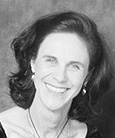
.gif)




